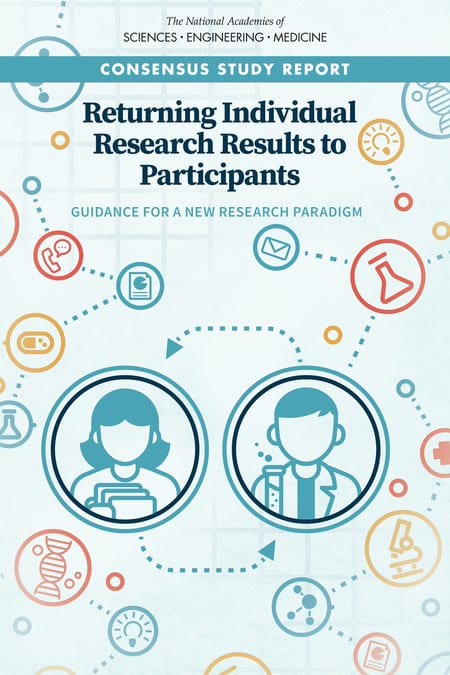Posted By: Jillian Galloway, MS, Science Policy Analyst, ASHG
As you may recall, last year, the National Academies of Sciences, Engineering, and Medicine (NASEM) was asked by the Centers for Medicare & Medicaid Services (CMS), the Food and Drug Administration (FDA), and the National Institutes of Health (NIH) to evaluate the many issues and perspectives surrounding ‘the return of individual-specific research results generated in research laboratories’.
In recent years, there has been significant discussion among scientists about the return of results to research participants. As geneticists and genomicists discover information of potential clinical benefit to participants, they are considering when it is appropriate to share such information with participants.

In keeping with the trend towards greater participant inclusion, the recently launched All of Us program promises to share individual-level data with participants. By signaling greater involvement in the research process and dubbing All of Us participants as ‘partners’, NIH hopes to make participation more valuable and equitable.
Given this context, the NASEM committee was charged with evaluating the ethical, social, regulatory, and operational issues associated with returning results to participants. With many members involved in such research, ASHG submitted comments to the committee that focused on the complexity of returning individual-specific results of genomics research, outlining areas of consensus and contention within the genomics community.
The NASEM committee’s report, released last month, aligns with ASHG’s comments in some ways as well as revealing meaningful differences of perspective. For example, ASHG recommended that research funding include financial support for returning results to participants to make the task more viable. However, the NASEM report calls for research institutions and funding agencies to “develop and provide access to the resources and infrastructure needed to ensure that investigators conducting testing…can meet the necessary standards for quality”. Overall, NASEM’s report emphasizes addressing the quality of results over the burden to researchers in operationalizing their return.
The committee recommends placing greater responsibility on researchers returning individual-specific research results. It also proposes several guiding principles for researchers: chiefly, that the return of results be considered from the inception of the study, through its design and development, and that laboratories that plan to return results adopt high-quality standards.
However, the committee acknowledges that the diversity in size, funding, and scale of research laboratories makes CLIA certification, the clinically required regulation for laboratories issuing any test results to individuals, at times inappropriate or unnecessary for returning results not intended to inform clinical care. To address the financial, logistical, and operational hurdles of returning high-quality laboratory analyses with confidence, the committee suggests the creation of an accepted quality management system for research laboratories as an alternative to CLIA certification.
The NASEM report also outlines the many scenarios and variables determining whether laboratory quality is sufficient for investigators to return individual research results. In addition, the committee calls for the continued assessment of participant preferences and values, echoing ASHG’s comments.
In summary, while the committee’s recommendations may increase the frequency of returning results, and thereby enlarge the demands upon researchers, they are in keeping with the general scientific move towards increasing researcher responsibility for the respect, trust, and needs of research participants.
ASHG will continue to monitor the activities of the various agencies to see how and to what extent they will adopt the recommendations set forth by the NASEM committee.
Jillian Galloway, MS, is a Science Policy Analyst at ASHG. For more information on ASHG’s policy priorities and activities, visit the Policy & Advocacy website.
